First released: October 2005
Aria: The Animation is a holiday - from sexual innuendo, from noise, from fighting and from bustle. As it meanders along, content to show the placid toil of the gondoliers in training - geishas of the canals in everything but name - each episode becomes less about individual triumphs and pacing and more about getting lost in the tranquillity the series has gushing from it. The series may not be to everyone's taste, it is as much a holiday from drama and plotting as everything else, but for those looking to escape into a pastel coloured reverie there really is no better series; especially so for fans of gentle voices, lilting music, oddly proportioned cats and occasional time travel.
Whereas most series blitz their budgets in the first episode with scenes of pomp and extravagance, here the most exciting development is when the chubby cat, president of Aria Company, is swept away by the current and the pink haired protagonist Akari unleashes her hidden skill: rowing backwards. It speaks volumes when it transpires this is the most dramatic event in the entirety of the thirteen episode run but sets up the kind of approach the series champions: measured, graceful and placid. The cast never raise their voices, the opening has no canned animation and instead glides across the character's day-to-day lives, even the ending by Round Table and Nino eases the episode to a smooth close so at no point is the atmosphere of blissful serenity broken.
It is rarely a compliment to mention a series sends you to sleep but here it is definitely beneficial: many episodes exist in a dream-like state where no harm, emotional or physical, can befall the protagonists and oddities such as time-travel or letters from the past are accepted without question. The protagonist Akari is subject to many of these quirks and there is an expectance for her to suddenly exclaim "Oh I'm in the past!", but pleasingly there is just a raised eyebrow and silent acknowledgement. This highlights a key issue with the storytelling in that it may skirt around obnoxious clichés however many of the stories themselves are very childish and range from training on the beach through to the series' low point which features a whole episode devoted to a deformed, codependent feline.
The characters aid its juvenile whims by not entirely archetypal, but enough to be predictable. The three trainees whose names all confusingly begin with A: Akari, Aika and Alice are also prone to being shown with goofy, super-deformed expressions which isn't entirely out of character but fractures the mood somewhat. Mitigating this are the three water faeries: Alicia, Akira and Athena who are supremely graceful and act as occasional mentors to their pupils who often cruise around together under the auspices of "group training".
Although Akari shares the traits of the three top gondoliers and is pitched to succeed Alicia, she is charmingly naive and has an infectious enthusiasm that elevates her above the common ultra-virtuous stereotype. Her relationships with the other characters form the backbone of the series, especially the pint-sized bit-part of the first episode Ai, however her connection with Alicia is heart-warmingly genuine and is one of the high points of the series. Its closest contemporary then in terms of ethos and theme is K-ON! which shares a similar appreciation of the ephemerality of the experiences and relationships of youth; episodes where all the characters do is reminisce around an open fire during winter extol the take away message that friendships and happiness are fleeting and best enjoyed while present rather than chased away with the vagaries of real life.
But whereas K-ON! is loud and brash, screeching with tween pop-rock, Aria the Animation is quieter, living up to its namesake and presenting a fairytale world of gnomes and flying postmen, where even the insects are twee and gussied up with ribbons. Beautiful but ultimately forgettable, this is escapism at its most pure: a world to get lost in, characters one would be happy to associate with and for once a future to look forward to. Some episodes are almost unforgivably slow, but even then the soft-hued visuals and harmonious score carry one away more than the stories ever could. Certainly not to everyone's liking but for those yearning to melt away into an audio-visual cloud and are able to ignore the faux-Italian trappings and inter-planetary gotchas, this is sublime.


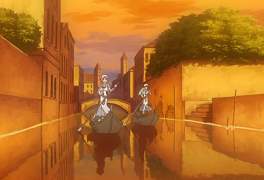

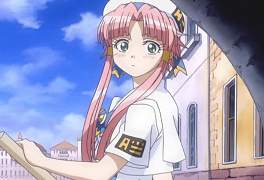


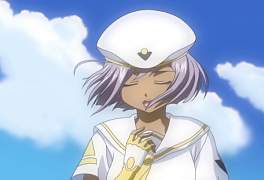


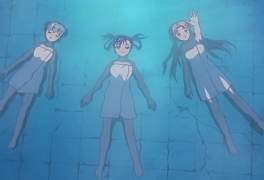
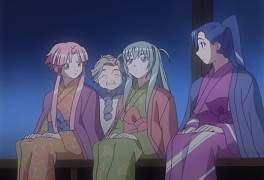
Just wait till you get to the Origination...